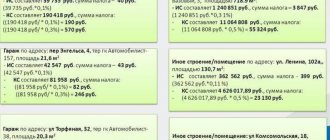If a pensioner owns a garage, he can dispose of it at his own discretion. But at the same time, you need to know whether you need to pay tax for a non-residential building of this type when using and selling it. There are many nuances that must be taken into account when conducting transactions related to the purchase and sale of non-residential real estate. In any case, it should be understood that the sale of any property involves the receipt of income, and therefore must be subject to certain financial obligations. Only certain categories of citizens can receive exemptions from them under certain circumstances.
Features of taxation for pensioners
Many people wonder whether retirees should pay garage taxes. Since this object belongs to non-residential real estate, it involves the payment of financial obligations, the amount of which is calculated depending on the cadastral value of the object. At the same time, the tax for pensioners who are the owners of the building provides certain benefits.
Changes in tax legislation on this issue came into force in 2015. Garage benefits for retirees in 2021 can only be provided if they are not used for other properties. That is, if, for example, an apartment and a garage are owned by a pensioner, then he must choose to which object to apply the benefit provided by law.
It is also important to remember that if a non-residential building is in shared ownership, then the benefit will apply only to the part that belongs to the pensioner. Another nuance is that regional authorities received the right to provide benefits. Therefore, you must first find out information from the tax authorities at your place of residence whether the pensioner needs to pay financial obligations in full.
In addition, a tax on the land on which the garage is located must be paid. If the land is owned by a garage cooperative, then the community pays the money, and then the amount is distributed among the owners of the garage buildings.
Garage tax for pensioners
Despite the fact that tax benefits for pensioners still remain, since 2015 the conditions for paying taxes for them have also become more stringent. How do pensioners pay tax now? A garage is usually only one property owned. Previously, pensioners were completely exempt from paying such taxes. Since 2015, they can choose only 1 tax-free property. Since paying for an apartment or house usually hits the pocket harder, especially if there is a mortgage, pensioners choose this property. In this case, the garage tax must be paid in full.
However, when choosing a garage as an object of preferential taxation, if it is divided into shares and the co-owner is not a pensioner, then you can avoid paying tax only for the part owned by the pensioner.
As for the land under the garage, the federal authorities have not provided any relief for pensioners. However, local authorities have the opportunity to reduce the rate or eliminate the tax for people of retirement age. To find out if this is possible in your area, you will need to contact your local tax office.
If there is still an opportunity to reduce the cost, you need to fill out an application and contact the tax office with a copy of your pension certificate and passport.
Do I need to pay tax on garage sales?
Another important question for retirees is whether they need to pay tax on garage sales in 2021. The answer depends on the following two factors:
- The assigned price at the conclusion of the transaction.
- How long was the special-purpose building owned by the pensioner?
It should be understood that the current legislation does not provide for benefits for pensioners when selling a garage. A pensioner must pay tax upon concluding a purchase and sale transaction in the amount of 13% personal income tax on the income received. If a person is not a resident, then by law a 30% tax is paid on the amount of income received.
To sum up the question of whether pensioners pay tax when selling a garage, we can clearly answer that payment is made on a general basis, as provided for individuals. Retirement age is not a basis for exemption from payment of financial obligations from income. The categories of citizens who can count on tax exemption are people of retirement age, living in certain regions. In addition, pensioners are exempt from financial obligations when selling property:
- Heroes of the Soviet Union and Russia.
- Having the Order of Glory of the third degree.
- Disabled people.
Who is entitled to a tax deduction?
The following have the right to it:
- those who purchased or built a garage;
- those who bought a plot of land for construction together with a residential building - both at their own expense and through borrowed money.
There are also citizens who are not entitled to a tax deduction. Namely:
- unemployed pensioners who do not receive official income and did not pay income tax in the previous tax period;
- people who have unofficial income (“salaries in envelopes”) and do not pay income tax;
- close relatives conducting a purchase and sale transaction between themselves (parents and children; adoptive parents and adopted children; full and half brothers and sisters; grandchildren and grandparents);
- entrepreneurs using a special tax regime (UTII, simplified tax system), regarding income received from business activities. But, if an entrepreneur, in addition to these taxation systems, carries out activities or performs work that is subject to personal income tax, he acquires the right to a deduction.
Payment Features
If the garage has been owned for more than 3 years, then after its sale there are no financial obligations. In this case, the tenure period is counted from the moment of registration of non-residential real estate in Rosreestr. Quite often there are situations where the building itself and the land under the garage have been owned for many years, but ownership of the garage was obtained in less than 3 years. Under such circumstances, in order to avoid paying tax when selling a garage in 2021, you will need to wait until the deadline provided by law. For example, if the garage is located in a cooperative, then it must initially be privatized. After this, it will be possible to sell a non-residential building without paying financial obligations only after 3 years.
When there is a need to sell non-residential real estate that has been owned and owned for less than 3 years, financial obligations necessarily arise. Their amount is calculated differently, its size depends on the availability of the following documents:
- The purchase and sale agreement, which specifies the transaction amount. In this case, the amount of 250 thousand rubles is deducted from the income received upon sale of the building, which is a refundable property tax deduction from the Federal Tax Service. Tax of 13% (or 30% for non-residents) is payable only on the difference.
- A purchase and sale agreement for a non-residential real estate property, which confirms a previously completed transaction. In this case, the amount that is subject to tax is the difference between the seller’s expenses and his income upon sale.
If the garage has been owned for less than 3 years, when the transaction amount is less than 250 thousand rubles. All categories of citizens are exempt from tax. A person who purchases a garage on a plot of land owned by the seller is exempt from paying land tax under the garage. This is due to the fact that he only pays for the purchase of the building. In the future, payment of land tax is carried out by its direct owner.
What does the garage tax consist of?
Many people consider a garage to be a fairly simple structure, but in fact it is a complex of complex buildings and the land on which it is located. All this is required by law to pay taxes. In fact, you need to make two separate payments:
- property tax;
- land tax.
What is the garage tax?
A garage is a full-fledged property - non-residential real estate. The garage tax rate in 2021 is, as before, determined by the municipality. The tax begins to be calculated from the moment the property is registered in the Register and directly depends on the cost of the garage. The cadastral value is taken into account.
According to paragraph 2 of Article 406 of the Tax Code of the Russian Federation, the garage tax for individuals is 0.1%. At the same time, it should be taken into account that the garage tax rate can be reduced to zero or increased, but not more than three times, by regulatory legal acts of representative bodies of municipalities (laws of the federal cities of Moscow, St. Petersburg and Sevastopol) .
The assessment is made by specialists, but they may allow errors. In this case, you can apply for recalculation of the cadastral value.
As for land tax, it depends on:
- cadastral valuation of a land plot;
- tax rates in the region (the national average is 1.5%);
Also, the payment will differ depending on the type of garage ownership. If the area under it is your property, then the tax office will send a receipt for payment.
If the garage is in a cooperative
If the land under the garage belongs to the cooperative in which you are a member, then the receipt will be common to the entire association. Accountants will independently add the required amount of garage tax in a garage cooperative to your payment slip.
If the land belongs to a cooperative, which may not pay tax, then the owner of the garage is also exempt from paying tax on the land under the garage.
If you rent out a garage, you will also have to pay tax on the income you receive from renting it out. The income tax rate is 13%.
Payment order
The income received from the sale of the garage will need to be declared. To do this, after the sale, the owner fills out a declaration in form 3-NDFL. It is accompanied by all the necessary documents that allow you to receive a property deduction, namely:
- Copy of civil passport.
- A copy of the pension certificate.
- Certificate of employment in form 2-NDFL for working pensioners. (You do not need to indicate the pension amount).
- A purchase and sale agreement drawn up in accordance with all the rules.
- A document that confirms that the seller has received the amount specified in the contract.
- Extract from Rosreestr confirming ownership.
- Documents indicating that the building was previously acquired by the seller, if any.
If you have all the necessary documents for the garage, you can submit a declaration to the regional inspectorate in several ways:
- When visiting the FMS service in person at your place of residence. It is allowed to submit documents by another person with a power of attorney certified by a notary.
- By registered mail with return notification.
- Using the State Services Internet portal.
The deadlines for filing a declaration are strictly fixed. The document recording the completed transaction for the sale of non-residential real estate must be submitted to the regional Federal Tax Service before April 30 of the next year after the sale transaction. As soon as the documents are verified by the tax inspector, the confirmed amount indicated in the declaration must be paid to the specified details.
Some nuances
If the garage was inherited, then the standard procedure is applied when selling it. That is, if the transaction amount is more than 250 thousand rubles. and the building has been owned for less than 3 years, then the amount of financial obligations is 13% of the income received for residents and 30% for people with citizenship of other countries. According to the law, non-residential real estate that was received by inheritance is not subject to tax. But you need to remember that to confirm this fact you will need to collect a large number of documents. You will definitely need to obtain a certificate of inheritance, for which a state fee is paid.
If a non-residential building is sold together with a land plot to which there is ownership, the tax deduction can be increased to 1 million rubles. But for this it is necessary to have separate certificates of registration in Rosreestr.
It is important to remember that financial obligations when selling a garage, if there are no legal grounds for receiving benefits, must be paid. Penalties are provided for failure to make a mandatory payment from income to the budget on time. If the declaration was submitted late, an additional fine will be charged in the range of 5%-30% of the debt amount. If the appointed payment deadlines are missed, a penalty is charged in the amount of 1/300 of the Central Bank refinancing rate.
Procedure for calculating personal income tax
To calculate personal income tax, you need to subtract the amount spent on the purchase of a garage from the cost of income. Then 13% of the remaining amount is calculated to be transferred to the budget. If there are no papers confirming the original cost, a tax deduction is applied. They deduct 250,000 rubles from the transaction amount. Calculate 13% of the balance.
To make it more clear, let's give an example. You decide to sell for 400,000 rubles. your garage, which you have owned for 2 years. You have the right to take advantage of a deduction or reduce the income received, on which personal income tax will be charged. We calculate the tax deduction as follows:
Cost of garage at sale - Maximum deduction amount = 400,000 - 250,000 = 150,000.
Now we calculate personal income tax: 150,000 * 13% = 19,500 rubles.






